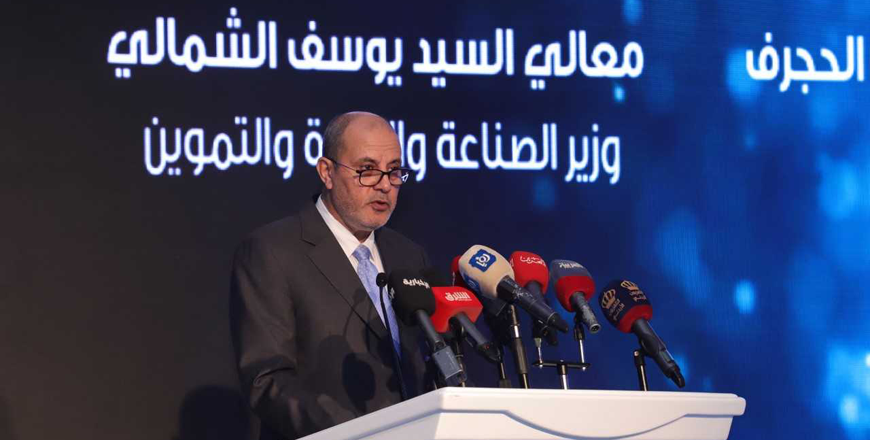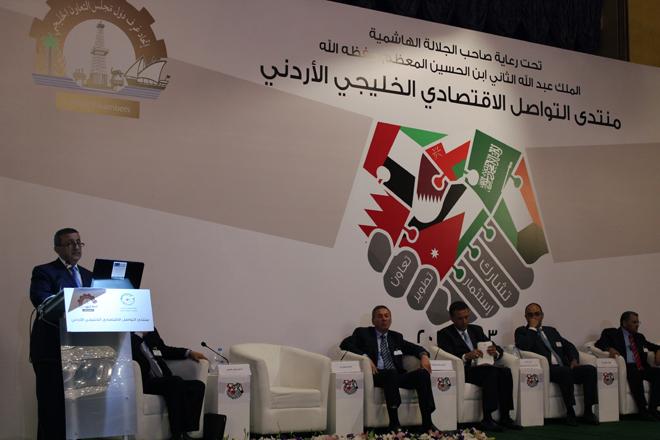You are here
Third Gulf-Jordanian economic forum begins in Amman
By Mays Ibrahim Mustafa - Sep 27,2022 - Last updated at Sep 27,2022

Minister of Industry, Trade and Supply Yousef Shamali addresses the third Gulf-Jordanian Economic Forum in Amman on Tuesday (Petra photo)
AMMAN — Deputising for Prime Minister Bisher Khasawneh, Industry, Trade and Supply Minister Yousef Shamali inaugurated the third Gulf-Jordanian Economic Forum in Amman on Tuesday.
The two-day event is organised by the Jordan Chamber of Commerce (JCC), in cooperation with the Federation of the Gulf Cooperation Council (GCC) Chambers, under the title “New Aspects for Economic and Investment Cooperation".
In his opening remarks, Shamali noted that this forum, which is “an example of the distinctive historical relations between Jordan and the GCC countries”, provides an opportunity to strengthen ties between the nations and to overcome obstacles.
He added that “the daunting events witnessed by the world in the past three years, including the COVID-19 pandemic and increasing natural disasters, such as floods and wildfires, as well as the political disturbances and wars, which burdened the global economic and social scene … have underlined the importance of cooperation and integration between the world’s various economies”.
Moreover, Shamali noted that there is “an urgent need” to direct efforts towards enhancing trade exchange and joint investment between Arab countries.
“A recent study issued by the Arab Monetary Fund (AMF) last May shows that the volume of interregional trade between Arab countries is 13.8 per cent of their total foreign trade, which is a modest number,” he said.
The minister also reviewed the volume of trade exchange between the GCC countries and the Kingdom, which reached $6.6 billion in 2021.
He added that Gulf investments in Jordan are “an added value to its national economy, enhancing its levels of growth and creating job opportunities for Jordanians”.
Shamali noted that the Kingdom, under the Economic Modernisation Vision, seeks to increase its GDP at an annual rate of 5.6 per cent by 2033.
GCC Secretary General Nayef Al Hajraf said that this forum “reflects the depth of brotherly relations between the GCC and the Hashemite Kingdom of Jordan”.
He also pointed out that the total trade volume between the two parties totalled $57 billion between 2013 and 2020, with Gulf investment in the Amman Bourse amounting to over $2 billion.
“The fluctuation in the global economy calls for expanding and strengthening cooperation with international markets,” the secretary general added.
Gulf investments in Jordan are concentrated in various sectors, including tourism, finance, commerce, healthcare, infrastructure, education, energy, telecommunications and information technology, according to Hajraf.
JCC Chairman Nael Kabariti warned of an approaching "global economic tsunami", saying that Arab countries should be "resilient and agile, and should establish strong economic alliances if they want to weather the storm".
He reiterated that the new economic reality necessitates new transformations and patterns, and that the forum is a continuation of efforts to build cooperation and "integration bridges" between Jordan and the GCC countries.
President of the Federation of Gulf Chambers Ajlan Al Ajlan expressed hope that the forum would open new aspects for economic and trade relations between the Gulf states and Jordan, stressing that strengthening pan-Arab economic cooperation is one way to achieve sustainable development in the region.
Ajlan also stated that the GCC countries' investments in Jordan are estimated at $40 billion in various productive, service, and industrial sectors, with an annual trade volume of about $6 billion.
The forum also witnessed meetings on the sidelines between business owners from both sides, as well as panel discussions and presentations on future investments and opportunities for cooperation in various fields.
Related Articles
AMMAN — Prime Minister Bisher Khasawneh on Tuesday stressed Jordan's commitment to further enhancing relations with Gulf Cooperation Council
AMMAN — Amman Chamber of Commerce (ACC) President Issa Murad proposed several mega-projects to Gulf Arab investors on Saturday.During a work
AMMAN — Deputising for His Majesty King Abdullah, Prime Minister Abdullah Ensour on Thursday inaugurated the Gulf-Jordanian Economic Communi

















